2011-2012学年初中英语九年级(人教新目标)素材(含教案和练习)Uni
- 格式:doc
- 大小:148.50 KB
- 文档页数:13
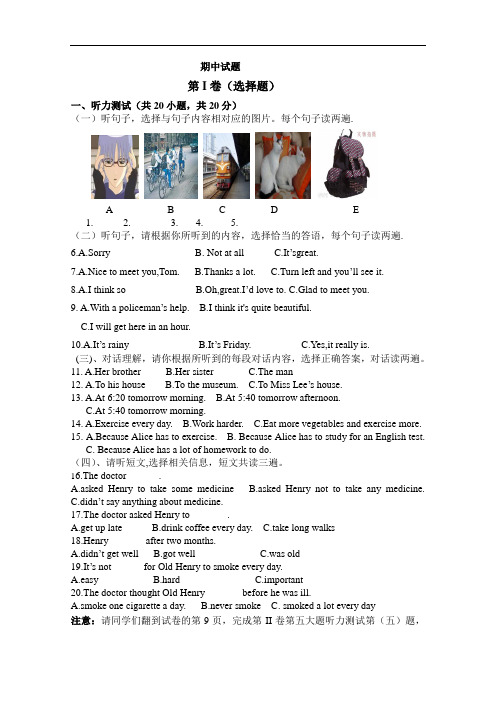
期中试题第I卷(选择题)一、听力测试(共20小题,共20分)(一)听句子,选择与句子内容相对应的图片。
每个句子读两遍.A B C D E1.___2.____3.___4._____5._____(二)听句子,请根据你所听到的内容,选择恰当的答语,每个句子读两遍.6.A.Sorry B. Not at all C.It’sgreat.7.A.Nice to meet you,Tom. B.Thanks a lot. C.Turn left and you’ll see it.8.A.I think so B.Oh,great.I’d love to. C.Glad to meet you.9. A.With a policeman’s help. B.I think it's quite beautiful.C.I will get here in an hour.10.A.It’s rainy B.It’s Friday. C.Yes,it really is.(三)、对话理解,请你根据所听到的每段对话内容,选择正确答案,对话读两遍。
11. A.Her brother B.Her sister C.The man12. A.To his house B.To the museum. C.To Miss Lee’s house.13. A.At 6:20 tomorrow morning. B.At 5:40 tomorrow afternoon.C.At 5:40 tomorrow morning.14. A.Exercise every day. B.Work harder. C.Eat more vegetables and exercise more.15. A.Because Alice has to exercise. B. Because Alice has to study for an English test.C. Because Alice has a lot of homework to do.(四)、请听短文,选择相关信息,短文共读三遍。
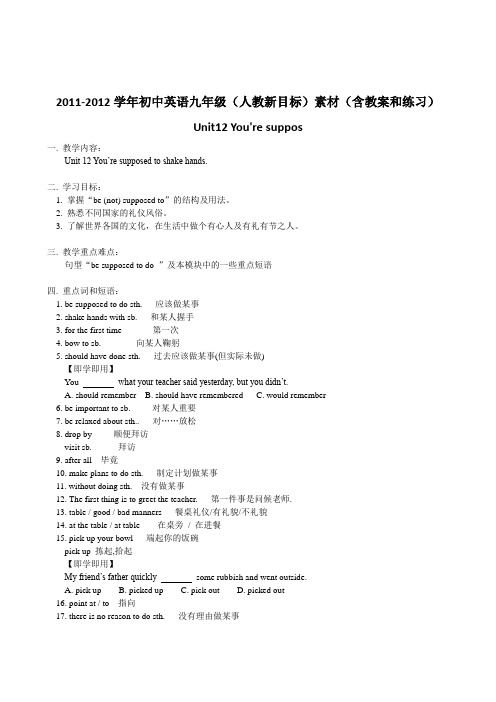
2011-2012学年初中英语九年级(人教新目标)素材(含教案和练习)Unit12 You're suppos一. 教学内容:Unit 12 You’re supposed to shake hands.二. 学习目标:1. 掌握“be (not) supposed to”的结构及用法。
2. 熟悉不同国家的礼仪风俗。
3. 了解世界各国的文化,在生活中做个有心人及有礼有节之人。
三. 教学重点难点:句型“be supposed to do ”及本模块中的一些重点短语四. 重点词和短语:1. be supposed to do sth. 应该做某事2. shake hands with sb. 和某人握手3. for the first time 第一次4. bow to sb. 向某人鞠躬5. should have done sth. 过去应该做某事(但实际未做)【即学即用】You what your teacher said yesterday, but you didn’t.A. should rememberB. should have rememberedC. would remember6. be important to sb. 对某人重要7. be relaxed about sth.. 对……放松8. drop by 顺便拜访visit sb. 拜访9. after all 毕竟10. make plans to do sth. 制定计划做某事11. without doing sth. 没有做某事12. The first thing is to greet the teacher. 第一件事是问候老师.13. table / good / bad manners 餐桌礼仪/有礼貌/不礼貌14. at the table / at table 在桌旁/ 在进餐15. pick up your bowl 端起你的饭碗pick up 拣起,拾起【即学即用】My friend’s father quickly some rubbish and went outside.A. pick upB. picked upC. pick outD. picked out16. point at / to 指向17. there is no reason to do sth. 没有理由做某事18. go out of one’s way to do sth. 特地做某事19. make sb. feel at home 使某人感到不拘束20. be different from 与……不同21. make a toast 敬酒22. older people 长辈23. give compliments 称赞24. make appointments 约会25. behave differently 表现不同26. begin with 从……开始27. not … but… 不是……,而是……28. Questions crowded my mind. 我满脑子都是疑问。
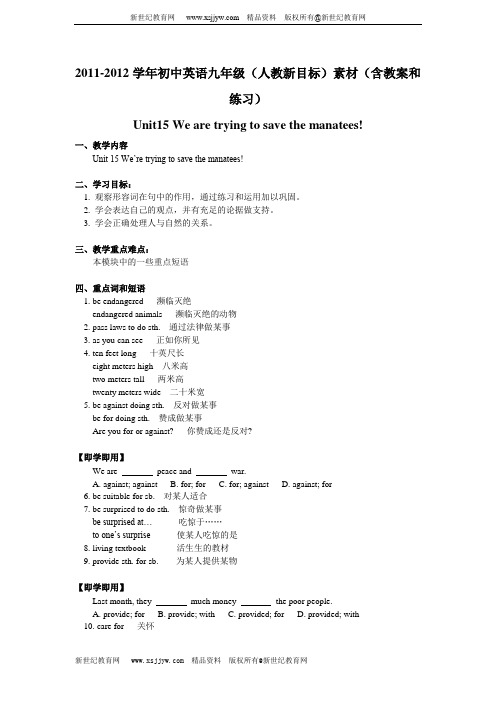
2011-2012学年初中英语九年级(人教新目标)素材(含教案和练习)Unit15 We are trying to save the manatees!一、教学内容Unit 15 We’re trying to save the manatees!二、学习目标:1. 观察形容词在句中的作用,通过练习和运用加以巩固。
2. 学会表达自己的观点,并有充足的论据做支持。
3. 学会正确处理人与自然的关系。
三、教学重点难点:本模块中的一些重点短语四、重点词和短语1. be endangered 濒临灭绝endangered animals 濒临灭绝的动物2. pass laws to do sth. 通过法律做某事3. as you can see 正如你所见4. ten feet long 十英尺长eight meters high 八米高two meters tall 两米高twenty meters wide 二十米宽5. be against doing sth. 反对做某事be for doing sth. 赞成做某事Are you for or against? 你赞成还是反对?【即学即用】We are peace and war.A. against; againstB. for; forC. for; againstD. against; for6. be suitable for sb. 对某人适合7. be surprised to do sth. 惊奇做某事be surprised at… 吃惊于……to one’s surprise 使某人吃惊的是8. living textbook 活生生的教材9. provide sth. for sb. 为某人提供某物【即学即用】Last month, they much money the poor people.A. provide; forB. provide; withC. provided; forD. provided; with10. care for 关怀take good care of sb. 照顾好某人look after sb. wellcare for sb. well11. urge sb. to do sth. 强烈要求某人做某事【即学即用】The teacher urges his students on time when they do everything.A. areB. beingC. to beD. be12. weigh 100 pounds 重100磅lose one’s wei ght 减肥13. average person 普通人14. take one’s own bag 带某人自己的包15. live close to 住得离……很近close the door 关门The door is closed. 门是关着的be closed to sb. 与某人亲密come very close 来得紧迫16. hear of 听说17. be built out of sth. 由……制造18. be an inspiration to sb. 对某人是一个灵感19. in one’s spare/free time 在某人空闲时间20. He is the most careful student in the class. 他是班上最认真的学生。

人教新目标英语初三unit9 讲义及练习〔二〕(Grammar focus)定语从句1——关系代词引导的定语从句.(关系代词引导的定语从句)〔一〕、定义:在复合句中,修饰某一名词或代词的从句叫做定语从句。
定语从句是指在一个句子中作定语的句子,定语从句要放在所修饰的词后。
如:1) The man who lives next to us is a policeman.2) You must do everything that I do.上面两句中的man和everything是定语从句所修饰的词,叫先行词,定语从句放在先行词的后面。
引导定语从句的词有关系代词that, which, who(宾格whom, 全部格whose)和关系副词where, when、why关系词常有三个作用:1、引导定语从句 2、替代先行词 3、在定语从句中担当一个成分〔二〕、关系代词引导的定语从句1.who指人,在从句中做主语(1)The boys who are playing football are from Class One.(2)Yesterday I helped an old man who lost his way.2. whom指人,在定语从句中充当宾语,常可省略。
(1) Mr. Liu is the person (whom) you talked about.注意:关系代词whom在口语和非正式语体中常用who替代,可省略。
(2) The man who/whom you met just now is my friend.3. which指物,在定语从句中做主语或者宾语,做宾语时可省略(1) Football is a game which is liked by most boys. ( which 在句子中做主语)(2) This is the pen (which) he bought yesterday. ( which 在句子中做宾语)4. that指人时,相当于who或者whom;指物时,相当于which。
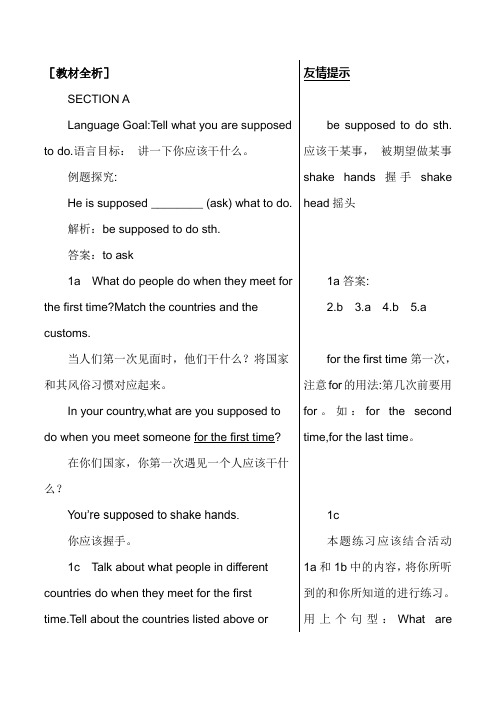
[教材全析]友情提示SECTION ALanguage Goal:Tell what you are supposed to do.语言目标:讲一下你应该干什么。
例题探究:He is supposed ________ (ask) what to do.解析:be supposed to do sth.答案:to ask1a What do people do when they meet for the first time?Match the countries and the customs.当人们第一次见面时,他们干什么?将国家和其风俗习惯对应起来。
In your country,what are you supposed to do when you meet someone for the first time?在你们国家,你第一次遇见一个人应该干什么?Y ou’re supposed to shake hands.你应该握手。
1c Talk about what people in different countries do when they meet for the first time.T ell about the countries listed above orbe supposed to do sth.应该干某事,被期望做某事shake hands握手shake head摇头1a答案:2.b3.a4.b5.afor the first time第一次,注意for的用法:第几次前要用for。
如:for the second time,for the last time。
1c本题练习应该结合活动1a和1b中的内容,将你所听到的和你所知道的进行练习。
用上个句型:What areother countries you know about.谈论在不同的国家里当人们第一次见面时他们干什么。
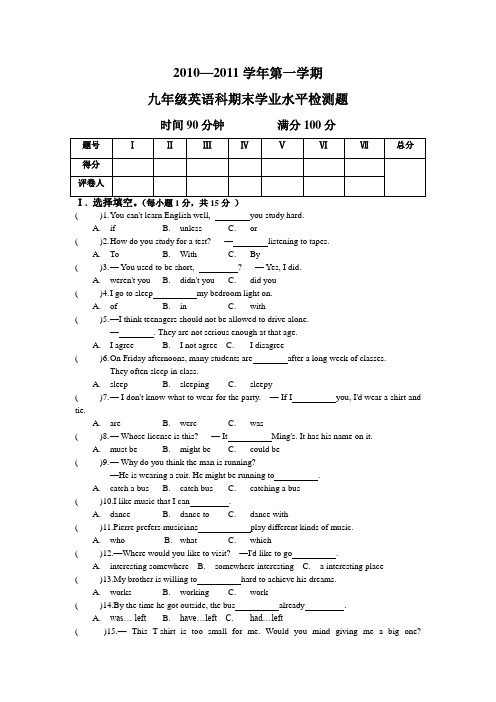
2010—2011学年第一学期九年级英语科期末学业水平检测题时间90分钟满分100分(每小题1分,共15分)( )1. Y ou can't learn English well, you study hard.A. ifB. unlessC. or( )2. H ow do you study for a test? —listening to tapes.A. ToB. WithC. By( )3. — You used to be short, ? — Yes, I did.A. weren't youB. didn't youC. did you( )4. I go to sleep my bedroom light on.A. ofB. inC. with( )5. —I think teenagers should not be allowed to drive alone.—. They are not serious enough at that age.A. I agreeB. I not agreeC. I disagree( )6. O n Friday afternoons, many students are after a long week of classes.They often sleep in class.A. sleepB. sleepingC. sleepy( )7. — I don't know what to wear for the party. — If I you, I'd wear a shirt and tie.A. areB. wereC. was( )8. — Whose license is this? — It Ming's. It has his name on it.A. must beB. might beC. could be( )9. — Why do you think the man is running?—He is wearing a suit. He might be running to .A. catch a busB. catch busC. catching a bus( )10.I like music that I can .A. danceB. dance toC. dance with( )11.Pierre prefers musicians play different kinds of music.A. whoB. whatC. which( )12.—Where would you like to visit? —I'd like to go .A. interesting somewhereB. somewhere interestingC. a interesting place( )13.My brother is willing to hard to achieve his dreams.A. worksB. workingC. work( )14.By the time he got outside, the bus already .A. was… leftB. have…leftC.had…left( )15.—This T-shirt is too small for me. Would you mind giving me a big one?—. Here you are.A. Not at allB. SureC. YesⅡ.句型转换,按要求完成下列各题。
Contents第一篇Unit1 How can we become good learners? (2)第二篇Unit2 I think that mooncakes are delicious. ......................................... 错误!未定义书签。
第三篇Unit3 Could you please tell me where the restrooms are? ................... 错误!未定义书签。
第四篇Unit 4 I used to be afraid of the dark. ................................................... 错误!未定义书签。
第五篇Unit 5 What are the shirts made of? ................................................. 错误!未定义书签。
第六篇Unit6 When was it invented? ................................................................ 错误!未定义书签。
第七篇Unit 7 Teenagers should be allowed to choose their clothes. ............... 错误!未定义书签。
第八篇Unit8 It must belong to Carla. .............................................................. 错误!未定义书签。
第九篇Unit9 I like music that I can dance to. ................................................. 错误!未定义书签。
九年级新目标英语第一单元作业一、单项选择:(计15分)( ) 1. He learns English by ____________ English songs.A. listenB. listen toC. listeningD. listening to( ) 2. If you practice ________ English every morning, you will improve it quickly.A. to readB. readingC. readD. be reading( ) 3. Do you have a partner to speak English ________?A. forB. toC. onD. with( ) 4. Tom decided __________ in China.A. travelB. travelingC. to travelD. traveled( ) 5. Do you enjoy __________ on the Internet?A. surfingB. surfC. to surfD. surfed( ) 6. She said she had some trouble ___________ her homework.A. finishB. finishingC. to finishD. finished( ) 7. Do you find this book ____________?A. frustrateB. frustratingC. frustratedD. frustration( ) 8. Can you tell me the best way ________ the problem?A. solveB. solvedC. to solveD. solving( ) 9. Jenny does not know where __________ on National Day.A. to goB. goingC. goesD. will go( ) 10. At the age of 18 he began to work___ a teacher in a country school.A. asB. byC. inD. at( ) 11. If you don’t know how to pronounce new words, in a dictionary, please.A. look up itB. look it upC. look them up D look up them( ) 12. There is ______milk in the bottle. Let’s go to buy some.A. a littleB. littleC. a fewD. few( ) 13. I haven’t seen the movie and my brother hasn’t _______.A. tooB. eitherC. alsoD. yet( ) 14. My father gave up ________ at last.A. smokeB. smokingC. to smokeD. smokes( ) 15. I spent half an hour ___________ my homework.A. finish doingB. to finish doingC. finishing to doD. finishing doing二、完形填空。
⼈教版新⽬标九年级U11.U12学案及练习题Unit 11、Unit 12 复习Unit 11 Could you please tell me where the restrooms are?语⾔功能:礼貌问路及回答。
重点句型:1. Could you please tell me where the restrooms are?Do you know where I can exchange money?2. There’s a bank on the second floor.Take …Turn right.The bank is next to the bookstore.重点语法:宾语从句1. 宾语从句的概念宾语是句⼦的重要成分之⼀,在多数情况下,是由名词性的词类充当的。
如果宾语部分是由⼀个句⼦充当的话,则被称为宾语从句。
我们以前学过的间接引语实质上就是宾语从句。
如:Mary said that she was going to visit Hong Kong.(that引导的宾语从句)宾语从句三件事,时态语序连接词;宾语是句⼦的重要成分之⼀,在多数情况下,是由名词性的词类充当的。
如果宾语部分是由⼀个句⼦充当的话,则被称为宾语从句。
我们以前学过的间接引语实质上就是宾语从句。
如:Mary said that she was going to visit Hong Kong.(that引导的宾语从句)宾语从句三件事,时态语序连接词;主从时态要⼀致,陈述语序才合适;⼀般问句做从句,连接词if别忘记;特殊问句做宾从,特殊问词莫漏掉。
2. 宾语从句的三要素——时态、语序、连接词(1)时态:主句和从句的时态要呼应。
即如果主句为⼀般现在时,从句可根据需要选择各种时态;e.g. We’re sorry to hear that your mother is ill.(主句是⼀般现在时,从句⼀般现在时)如果主句是⼀般过去时,从句只能⽤过去的某种时态(包括⼀般过去时、过去进⾏时、上⼀页下⼀页。
Units 11—12要点梳理【词汇拓展】1. relaxed(adj. )放松的→__________(n. /v.)放松;休息→__________(adj.)令人放松的2. polite(adj. )有礼貌的→__________ (adv. )有礼貌地;文明地→__________ (adj. 反义词)失礼的;粗鲁的→politeness(n. )礼貌3. close(adj. )接近的→__________v.关上→__________ (adj. )关着的4. western(n. )西方的→__________ (n. )西方→__________n.东方5. crowd(v. )挤满;充满→crowded(adj. )拥挤的→ uncrowded(adj. . 反义词)不拥挤的;宽敞的6. organized(adj. )有组织的→_____________(v.)组织___________________ (n. )组织;机构7. custom(n. )风俗;习惯→_____________ (n. )顾客8. beside(prep. )在…旁边;在…附近→besid es(adv. &prep. ) _____________9. inexpensive(adj. )不昂贵的→_____________ (adj. 反义词)昂贵的10. wonder(v. )觉得奇怪;想知道一_____________ (adj. )精彩的【重点短语】1. buy shampoo买洗发水2. get some magazines买杂志3. make a telephone call打电话4. save/exchange money存/兑换钱5. buy some writing paper买书写纸6. take the elevator/escalator to… 乘电梯/扶梯到……7. _____________向左/右转8. take a vacation度假9. dress up as clowns打扮成小丑10. take dance lessons上舞蹈课11. __________________________ 把某物借给某人12. ask for information or help询问信息或求助13. make requests请求14. _____________依靠15. 1ead into a question or request导人问题或要求16. _____________ 在……和……之间17. a good place to eat/hang out吃饭/闲逛的好地方18. the world’s largest water slides世界上最大的水滑道19. ________________________ 在另一方面20. in some situations在某些场合21. _____________为了(不)…… 22. table manners餐桌礼仪23. (not)talk at the table(不要)在饭桌上说话24. pick up the bowl to eat端起碗吃饭25. wipe your mouth with your napkin用餐巾擦嘴26. 应该做某事__________________________ 27. 指向某人______________28. make sb. feel at home _________________ 29. 犯错误______________30. ______________ 握手31. drop by顺便拜访32. 制订计划做某事______________ 33. ______________ 生气34. go out of one’s way to do sth. 特地(不怕麻烦)做某事35.使某人感到宾至如归36. make a toast祝酒;敬酒37. ______________毕竟,终究52. first of all______________ 53. ______________书面英语【重点单词短语】1. in order to为了……(1)in order to常在句中作目的状语,其否定形式为______________。
2011-2012学年初中英语九年级(人教新目标)素材(含教案和练习)Unit11 Could you please tell me where the restroom一. 教学内容:Unit 11 Could you please tell me where the restrooms are?二. 学习目标:1. 学会如何有礼貌地获得信息,培养日常生活中问路与指路的能力。
2. 掌握宾语从句三. 教学重点难点:宾语从句四. 重点词和短语:1. make a telephone call 打电话2. save money 存钱3. on the second floor 在二楼4. take the escalator to the second floor 乘电梯去二楼5. turn right / left 向右/左转【即学即用】同义句转换:Go across the bridge, and turn right at the first turning.Go across the bridge, and on the right.6. go past the bank=pass the bank /+n. 经过银行come by=go by(不及物)经过7. go straight ahead 一直往前走go out of the front door 走出前门walk about three blocks 走大约3个街区8. on the left / right(of)在……的左边/右边between…and… 在……之间next to 在……旁边in front of 在……前面(外部)in the front of 在……前面(内部)across from 在……对面9. hang out with sb. 和某人闲荡10. dress up 穿上盛装;打扮get dressed 穿衣服dress oneself 给自己穿衣服dress up as clowns 打扮成小丑11. both …and… ……与……都(两者都)12. take dance lessons 上舞蹈课13. ask for information / help 寻求信息/帮助14. similar requests 同样的提问15. make requests 提出要求16. change the way we speak 改变我们说话的方式17. depend on 取决于18. lead in to a question 引入一个问题19. be sorry to do 遗憾做……20. in a way 在某方面21. in order(not)to do 为了(不)做某事【即学即用】同义句转换:She went to England last year so that she could learn standard(标准的)English.She went to England last year learn standard English.22. language etiquette 语言礼节23. hand in 上交五. 重点、难点、考点及疑点注释:1. Could you please tell me where the restrooms are? 请问洗手间在哪里?(标题)本句是问路或问处所的常用语,通常应先说excuse me,以引起对方注意,也表示尊重对方。
句子中的where the restrooms are是由where引导的宾语从句,它在句中作动词tell的直接宾语,是由特殊疑问句where are the restrooms改变语序而成。
再如:Excuse me. Could you tell me where Yu Hong Middle School is?打扰了。
请问育红中学在哪儿?知识拓展问路的表示法英语中表达问路或处所的句式有不少,下面介绍几种常用的问路的方法。
试译:打扰了。
请问去邮局怎么走?Excuse me. Could you tell me the way to the post office?Excuse me. Could you tell me how I can get to the post office?Excuse me. Could you tell me how to get to the post office?Excuse me. Could you tell me where the post office is?Excuse me. Which is the way to the post office, please?Excuse me. Where’s the post office, please?Excuse me. How can I get to the post office, please?2. Th ere’s always something happening. 总是有事情发生。
(Section A, 3a)本句是there be句型的一个固定结构,即there be+sb./ sth.+doing sth.,意为“有……在做……”。
My friend said there was a truck collecting rubbish outside.我的朋友说外面有一辆卡车正在收集垃圾。
There is a Mr Wang waiting to see you outside your office.有一个姓王的人在门外等着要见你。
【即学即用】There are many students magazines in the reading-room.A. readB. to readC. readingD. are reading知识拓展◎there be+sb. /sth.+to do sth.,表示“主语将做某事”。
There will be some Australian students to come to our class.有几个澳大利亚的学生要到我们班里来。
◎根据意思上的需要,可以将there be句型中的be换成其他含有“存在”意义的不及物动词或词组。
常见的这类动词(词组)有:lie, live, stand, appear, seem to be等。
例如:There stands a big tree in front of the house. 那座房子前有一棵大树。
There seems to be a misunderstanding between us. 我们之间好像有些误解。
3. I also like to look at books in the bookstore. 我也喜欢在书店里看书。
(Section A, 3a)汉语的“看书”既可表示“阅读”的意思,也可表示“翻看一下”,“随便看看”的意思。
英语的表达在词语上就有所不同了。
请“看”区别。
He looks at that book, takes it down and reads it carefully.他看了看那本书,然后拿下来,认真地读了起来。
looks at that book与read it(the book)在内容上是完全不同的。
look at that book仅指“看书”,用来表示“看了看”,不是以阅读为目的;而read it(the book)则是“读了读”书中的内容。
4. Go past the park and turn left onto Oak Street.走过公园,然后向左拐到橡树街。
(Section A, 4)go past the park...是一种指路方式,go past表示“走过”的意思,past是介词,意为“途经”,“经过”。
When she went past the parking, Mary saw a man standing at a new car.当玛丽走过停车场时,看见一个人站在一辆新车旁。
【友情链接】常见的指路表达方式有:Walk along/down this road, and take the first crossing on the right.沿着这条路向前走,在第一个十字路口向右拐。
Go along this street, and turn right.顺着这条路向前走,然后向右拐。
Walk on and turn left, and you will see the tall building on the right.继续向前走,然后左拐,在右边你就会看见那栋高楼了。
Go along/down this street to the traffic lights, and turn left.沿着这条路向前走,一直到交通灯处,然后向左拐。
5. …and eat at Uncle Bob’s. ……在鲍伯叔叔的小店吃饭。
(Section B, 3a)当名词表示店铺、办公室或某人的家时,名词所有格所修饰的名词常常省去。
Uncle Bob’s是名词“’s”所有格的一种特殊用法。
在表示店铺,餐馆,某种职业,某人的家等名词的所有格后面的名词,常可以省略。
如at the doctor’s=at the doctor’s clinic“在大夫的诊所”;at Mr Green’s=at Mr Green’s home“在格林先生家里”。
特别提示在表示店铺、场所及姓氏的名词前,要用定冠词the,在表示称呼语的名词前,要加物主代词。
at the barber’s “在理发店”;at my uncle’s “在我叔叔家”6. They have organized games and the staff dressed up as clowns. 他们组织游戏活动,工作人员打扮成小丑的模样。
(Section B, 3a)◎dress作为及物动词,指穿衣服的动作,后面不用表示衣服的名词作宾语,但可用指人的名词或代词作宾语,表示给某人穿衣服。
She dressed her children quickly.她很快给孩子们穿上衣服。
◎dress的过去分词dressed与get连用表示“穿上衣服”。
Let’s get dressed and leave at once.咱们穿好衣服马上出发。
◎dress up是“化装”,“穿上盛装”,“打扮”的意思。
They all dressed up as PLA men.他们都打扮成解放军的模样。